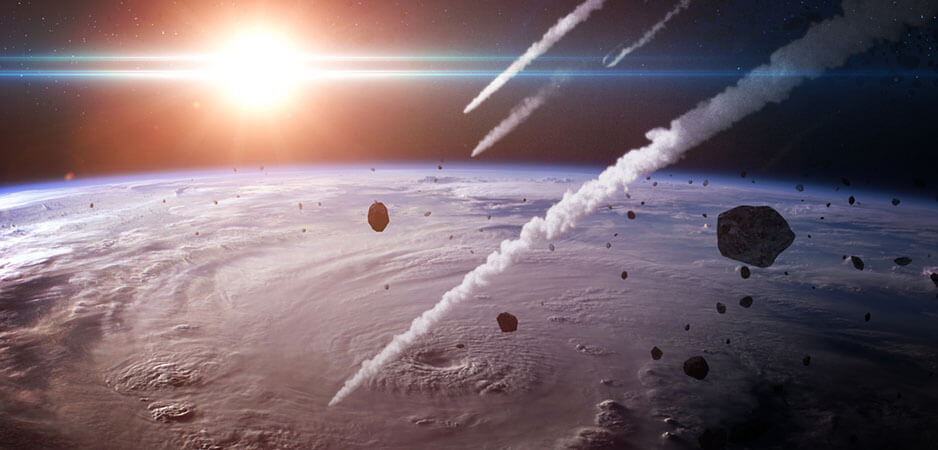Now that we’ve got your attention, Arek Sinanian examines the global stalemate over climate change with this analogy about a meteor heading for Earth.
There is so much in the world to be optimistic about. But when it comes to the current global position on climate change, I often vacillate between optimism and despair. My previous articles on Fair Observer demonstrate this.
Now imagine this: A group of highly-respected astronomers who have been studying the skies for decades with the latest available technology have observed a meteor (aka a very large rock), half the size of our moon, hurtling in our direction. A peer-reviewed scientific paper is submitted to the United Nations predicting that this very large rock is expected to collide with Earth in 12 months, with catastrophic effect. The paper predicts that this event will wipe out humanity and all the rest of living things on the planet. Action must be taken immediately, otherwise we are doomed. We can either take drastic action or we can just enjoy ourselves as much as we can for the next 12 months, and then it’s all over.
How would the world deal with such a predicament?
No doubt, there would be the usual denialist responses. How do we know that these astronomers have got it right? If it’s such a large rock coming our way, how come we can’t see it in the sky? What if it’s not as big as they say, and it won’t be such a huge catastrophe? What if the calculations are mistaken and it will take hundreds of years instead of 12 months? Could it hit some other planet on its way to us and, therefore, get destroyed? And so on.
All the calculations are checked over and over, by hundreds of astronomers, mathematicians and scientists and the results confirm that the rock is somewhere between 40% and 60% of the size of our moon, and it will collide with Earth between 10 months and 18 months?
So the deniers now can latch on the uncertainty: Oh, so there’s disagreement amongst the experts, and we don’t know exactly how big it is, and don’t even know exactly when it’s going to reach us. A few scientists even claim that this is a completely fraudulent fabrication by large corporations and, in particular, the arms industry.
You get the picture.
While all the necessary questioning and reassessment goes on, that enormous rock is coming in our direction at 50,000 miles an hour. So, what would probably happen is the gathering of the greatest minds and technologists, locking them in a large room, give them a limited time and let them out only when they have a solution to the problem, at any cost.
Now, I’m not suggesting that such a scenario (if it were to happen) is the same as the current stalemate of climate change. Not least is that the “large rock coming our way” scenario is a singular effect, while climate change is more like millions of smaller rocks coming our way for the rest of time. And the rocks will get bigger as time goes by, unless of course we do something about it.
And here’s the other main difference. While a likely solution for the “rock” is to destroy it, by contrast, we’ll need many solutions on many fronts, to mitigate climate change (or destroy the numerous and smaller “rocks” of climate change). In other words, our response isn’t to “do something about it,” but we need to do numerous things.
And that’s why the challenges of climate change are often described as a “diabolical problem.” As I’ve described in my book, A Climate for Denial, climate change is diabolical because, firstly, it is difficult to define. Some people are now suggesting that it shouldn’t be called climate change because the climate has been and will continue to change. And continuing the rocks-coming-our-way analogy, the rocks of climate change are different sizes (some enormous, some the size of a pebble), all traveling at different speeds, and they will all hit the Earth in different locations, at different times. Some rocks will be so small that a simple umbrella will be adequate for protection (is there a pun in there?). Some places on Earth will not even be hit or be affected by any rocks at all.
 Climate change is diabolical also because its impacts are environmental, physical, social, and economic, and the solutions include technology, economic and social change, political will and global agreements amongst nations with enormously disparate economies, social structures and technological capabilities. And the impacts (the rocks) will be completely different in different parts and nations of the world. Ironically, tragically, some of those most impacted will be least capable of dealing with them.
Climate change is diabolical also because its impacts are environmental, physical, social, and economic, and the solutions include technology, economic and social change, political will and global agreements amongst nations with enormously disparate economies, social structures and technological capabilities. And the impacts (the rocks) will be completely different in different parts and nations of the world. Ironically, tragically, some of those most impacted will be least capable of dealing with them.
Climate Paralysis
There is no doubt that the current stalemate in addressing climate change is mainly due to its diabolical nature. The appropriate way to deal with such problems is not to see them as a singular “rock” to destroy, but to tackle them in small steps and in achievable chunks.
I’m often asked, “What’s the one thing we must do?” The answer is that there are many things we must do, and we must all do them all now. And we must all do them, all of us contributing to the desired outcome.
Because of that complexity, we get paralyzed. It’s all too much to bear and that contributes to denialism. We know what to do — we must drastically reduce our greenhouse gas emissions and reliance on fossil fuels — but there’s so much to do to achieve this. It’s so complex and debilitating that even an “agreement to agree to do something about it” becomes an exciting outcome of a UN climate conference.
As it turns out, actions are being taken on many fronts: renewable energy for power generation, electric and hydrogen cars for transport, energy efficiency in manufacturing and agriculture. But much of this is being driven by market forces, rather than urgent global responses to a significant existential threat. It’s almost equivalent to responding to the threat of the “rock” half the size of our moon coming our way because it’s likely to affect property prices in New York City. Market forces rarely get it right when it comes to addressing social and environmental issues. It’s been suggested by eminent economists that climate change demonstrates the failure of market forces because of their lack of consideration of long-term environmental costs.
It may not be a stalemate. It may be described as paralysis. But relative to the required speed for climate action, it’s at best advancing at a snail’s pace while the rocks keep coming.
The views expressed in this article are the author’s own and do not necessarily reflect Fair Observer’s editorial policy.
Support Fair Observer
We rely on your support for our independence, diversity and quality.
For more than 10 years, Fair Observer has been free, fair and independent. No billionaire owns us, no advertisers control us. We are a reader-supported nonprofit. Unlike many other publications, we keep our content free for readers regardless of where they live or whether they can afford to pay. We have no paywalls and no ads.
In the post-truth era of fake news, echo chambers and filter bubbles, we publish a plurality of perspectives from around the world. Anyone can publish with us, but everyone goes through a rigorous editorial process. So, you get fact-checked, well-reasoned content instead of noise.
We publish 2,500+ voices from 90+ countries. We also conduct education and training programs
on subjects ranging from digital media and journalism to writing and critical thinking. This
doesn’t come cheap. Servers, editors, trainers and web developers cost
money.
Please consider supporting us on a regular basis as a recurring donor or a
sustaining member.
Will you support FO’s journalism?
We rely on your support for our independence, diversity and quality.






